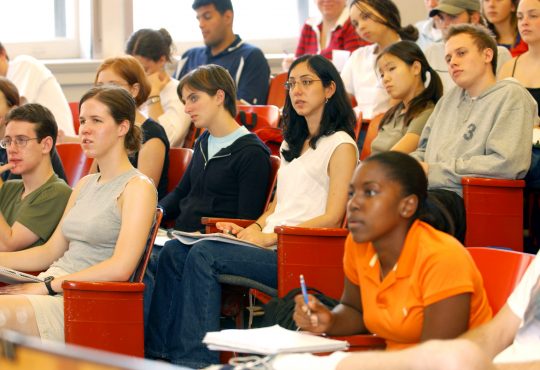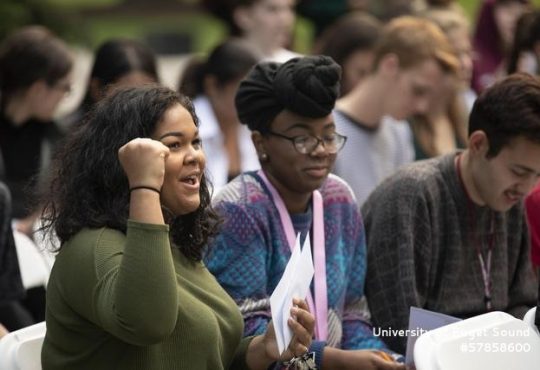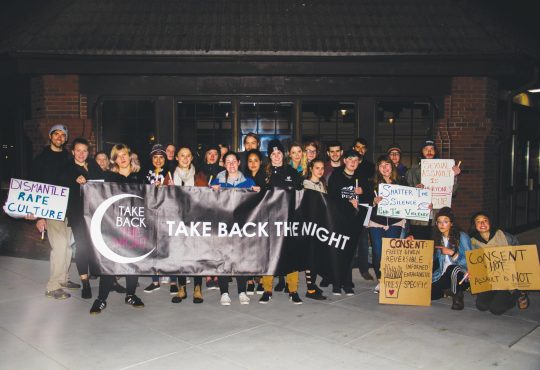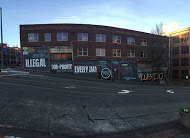Reporter Paul Goudarzi-Fry sat down with senior Senator C.J. Quierolo to discuss activism, rhetoric and some of the issues at Puget Sound. The thoughts and opinions expressed in this interview are subjective observations and musings, and do not represent an official stance by Quierolo regarding their work in The Trail, Wetlands, Black Ice or ASUPS media and its affiliates.
Paul
Goudarzi-Fry: How do you move an audience, as an activist, from awareness to engagement?
C.J.
Quierolo: I feel like the way that audiences or just… people come to be engaged in whatever movements they’re engaged in is by understanding the concreteness of the situation with respect to their particular lives and experiences, because lived experience is much more important from the view of community building and organizing as opposed to abstract or theoretical coherence. And so it’s important to engage the direct material conditions that students, audiences, people are living under when you’re engaging with them, because otherwise, you’re not engaging with them.
PGF: Does activism [as such] have a goal?
CJQ: I wouldn’t say there’s really a thing called ‘activism;’ I think there are… different types of things that are characterized as ‘activist.’ I feel like activism is agitating for a certain kind of movement or cause. It can be progressive or reactionary, liberatory or coercive, and so I feel like activism is more a set of methods and tactics that are utilized to instrumentalize or enact particular goals. So activism, as such, I would not say has a goal. It’s a series of tactics.
PGF:Tactics to what end?
CJQ: Well, that depends on what kind of goal you have in mind. So for example, [the] gender-neutral bathroom action group—we had a goal, which was [to] get access to single-user, ADA-accessible, gender-neutral bathrooms in a series of buildings on campus. So our tactics were [sic] engaging with committees directly related to those buildings, as well as articulating why the status quo of those particular buildings was bad, so that the university would have to change the situation. If people had different goals, they might have utilized different tactics.
PGF: How would you define what you personally do on campus regarding social justice, the rhetorical sphere, etc.?
CJQ: I would say that what I am most concerned with on campus is working to help better achieve conditions of liberation for students who exist in marginalized communities. The people closest to me in the categories and communities that I engage with most directly are queer, trans, people of color, people of low income and people with disabilities, because I feel like those are a particular cluster of structural forms of violence that our university is relatively unable to address in the status quo, and which inform the operations of this university at a series of levels. And so I feel like characterizing this work as work for liberation characterizes it as part of a movement beyond just the university setting. Because if we become parochial in our view, then we just become disconnected from the real communities and the real materiality and concreteness of those situations elsewhere also.
PGF: What sort of critical responses have you received from the campus body and the community as a whole? Where do these responses come from, and how do we deal with them?
CJQ: Well, I feel like people who are reactionary in response to these tactics tend to respond in anonymous forums such as Yik Yak, as opposed to engaging with either signed comments in a place like The Trail, or Wetlands, or even Facebook. But they retreat to anonymous networks because, for whatever reason, they feel like they can’t articulate their perspectives publicly. But I feel like there’s also a more liberatory response, because this is all part of building community, and so that always entails—you know—realizing what communities you’re not in and how you want your communities to be as opposed to how you don’t want them to be. So if we would rather have communities that are built on mutual uplifting and relations of… unconditional support for liberation, then that requires…shifting our focus away from the popularity of our decisions and towards whether or not they help students who are actually most directly impacted by structural inequity.
PGF: In what ways, over the course of your time within the community, have you seen changes and developments at Puget Sound?
CJQ: I feel like a couple of years ago, the student body was more… apathetic in response to a lot of these things. I think now the student body is largely more divided between those who implicitly support these sorts of actions and those who are far more reactionary than past students have been, I think, because they feel that their status of privilege and relative freedom vis-à-vis marginalized students is being questioned in ways they’re not used to dealing with, and they’re used to institutions and the university in particular proceeding from their perspective as an assumed, unstated center of analysis. And when that is destabilized or disarticulated, then they perceive it as a threat to themselves, which misconstrues the work of collective liberation as somehow a threat to these individual students, which implicitly assumed they don’t want to exit the structures of privilege and power they exist in now. Because otherwise, why would they feel threatened?
PGF: One of the criticisms that I have personally heard is that some of the tactics by social justice activists… on this campus are somehow belligerent or combative in a way. How would you respond to these criticisms/allegations?
CJQ: I would say that those sorts of allegations rely on an understanding of civility as antithetical to affective emotional response which incorrectly, inapropriately relegates emotion outside of the sphere of the university’s operations, which ignores the ways in which all of us come to not only academic but also social and political debates and discussions and conversations with different identities, different backgrounds, different baggage and different emotionalized histories of trauma and exposures to these structures of violence that all structure the ways that we come to these conversations. And so students, I think, who say that we’re belligerent, or that we’re agitating too much… are unable to actually just engage with the substance of the issues and recognize the gravity of the scenario that is being articulated, and so they retreat into an emotional repression that they project at the activists, in a way, to disavow their own existence within the structure of privilege that’s being yelled at.
PGF: How do we connect these people from this sheltered area into a space where they can feel more comfortable with an emotionally charged form of discussion, as it were?
CJQ: Well, it seems like that is part of the responsibility of allies and people who self-identify as allies in a number of communities, because people who exist in relative privilege and who exist as allies should be articulating these structures and the privileges to their peers so that [the] responsibility doesn’t fall on relatively marginalized students in a given situation… Otherwise, what you get is students who know the gravity of the scenario articulating to the students who don’t. Then the students who don’t just refuse to engage because they assume that it’s hyperbolized, or they assume that it’s impossible, or they assume that it’s just not real, and so they just want to focus on their homework… But the work of education is part of the work of the university, and part of living in a community of scholars means that peers should engage each other in issues of… social change. And so I think that means that allies should be discussing with their peers how they can come to a better understanding surrounding issues of social justice and privilege, and also taking seriously the words of marginalized students, because they’re the ones who know best the situation.





